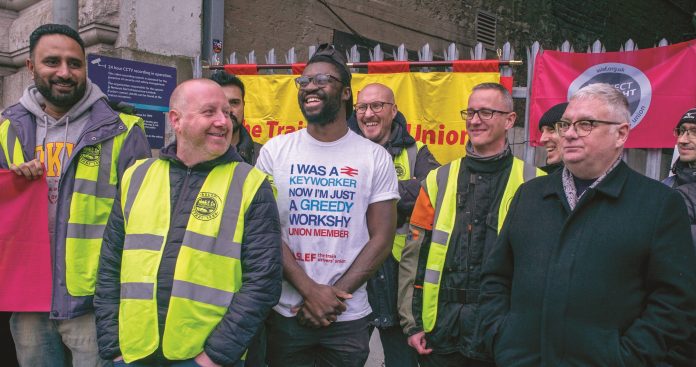Kristian O’Sullivan, ASLEF conference delegate
From 19–24 May, delegates from all across the country met for the train drivers’ union Aslef 2024 rules conference, taking place during the longest-running national dispute our union has ever been involved in.
Train drivers representing all groups of the membership were in attendance from passenger (Train Operating Companies – TOCs), freight (Freight Operating Companies – FOCs), devolved nations’ government-managed rail, privatised franchises and many others.
Among many important proposals regarding policy and rule changes, a motion presented by Socialist Party members on the Tory minimum service levels law was passed unanimously, calling on Aslef to coordinate with other unions against any employer, private or public, that looks to use the law, including potentially a 24-hour general strike.
Unsurprisingly the two biggest topics that demanded the most attention from delegates were regarding Labour affiliation and the upcoming general election, and where the national dispute was heading.
In our national dispute, many delegates were happy at the provisional indication that talks had resumed – saying that this had probably come about due to the Tories’ massive electoral blow in the local elections.
General election
Despite Labour affiliation being maintained, the majority of delegates who spoke in favour of keeping the Labour link started off with stating how it was not done out of enthusiasm for either Keir Starmer or the Labour Party. Many argued that it was a matter of getting the Tories out by any means necessary now, and then revisiting Labour affiliation in two years’ time at the 2026 rules conference – to send a message to a Starmer-led government that Aslef could cut the link if industrial and political betrayals continue.
Many members expressed no trust in Starmer or ‘New Labour 2.0’. But that doesn’t mean we can’t apply pressure, especially in our national dispute. Socialist Party members argue that we should demand of Starmer that he steps in to resolve it straight away – by guaranteeing a decent pay rise and no attacks on jobs and conditions, and by promising to nationalise the rail industry fully immediately, rather than wait for the franchises to run out – and we should make it clear we are ready to strike again to fight for those demands.
Jeremy Corbyn
On the last day of conference, Jeremy Corbyn announced his stand as an independent. Two Aslef branches moved an emergency motion, to make a statement and financial contribution of support to his campaign. If Aslef were to support Corbyn it would greatly increase the pressure on Starmer. But this was prevented from discussion on procedural grounds.
But the need for the trade unions to support candidates that fight for our demands, including Jeremy Corbyn, and take steps to a new workers’ party, put across by members of the Socialist Party outside and inside the conference, struck a chord with a layer of Aslef activists – more so than just the idea of disaffiliating.



